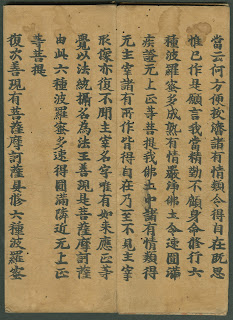 |
Fragments from the Biblia Pauperum
Netherlands, ca. 1460-1470 |
Wood has been used as a method of communication for time out of mind, typically by expressing an artistic ideal through the the grain and texture of the material. However, as printing evolved, the use of wood to express both a literal and figurative meaning at the same time became more prevalent. The inclusion of both text and imagery on the same block was initially most widespread in Japan, China and other Asian regions, though in Europe it actually flourished most widely at around the same time as movable type was developed. These "block-books" eventually fell into decline and wood came to be employed mainly for creating imagery to accompany the text.
 |
Leaves By The Wayside
Title page block for first book
printed in the Graphic Arts
Workshop at Dartmouth College, 1948. |
The process of creating a woodblock for printing is a fairly simple one in concept. The desired image or text is drawn onto the block surface, but reversed from the way it will eventually appear on the paper or other page material and the "white space" is removed with a variety of woodworking tools. The remaining wood surface is then covered in ink and a sheet of paper is pressed onto it. The ink transfers from the wood to the paper, but only on those sections that have not been removed. The thickness of the woodblock is typically matched to the height of the type so that a full page can be printed in one step.
 |
Prajnapamita Sutra
Japan, ca. 14th century |
The more elaborate the design the more care must be taken in executing it. The wood itself must be chosen and prepared with care to minimize cracking and warping due to the wood's natural movement as it interacts with its environment and the stresses that the block undergoes in the printing process. Even a small press can produce a tremendous amount of force. An example of a block which cracked can be found in our collection of
Barry Moser's Alice in Wonderland.
The examples pictured here are taken from various collections. Ask for
Val 898.1 D14 U7 (
Prajnapamita Sutra),
Rare Book Z 241 .B6 (
Biblia Pauperum) and
Lansburgh 30 (
Leaves By The Wayside title page illustration).



No comments:
Post a Comment